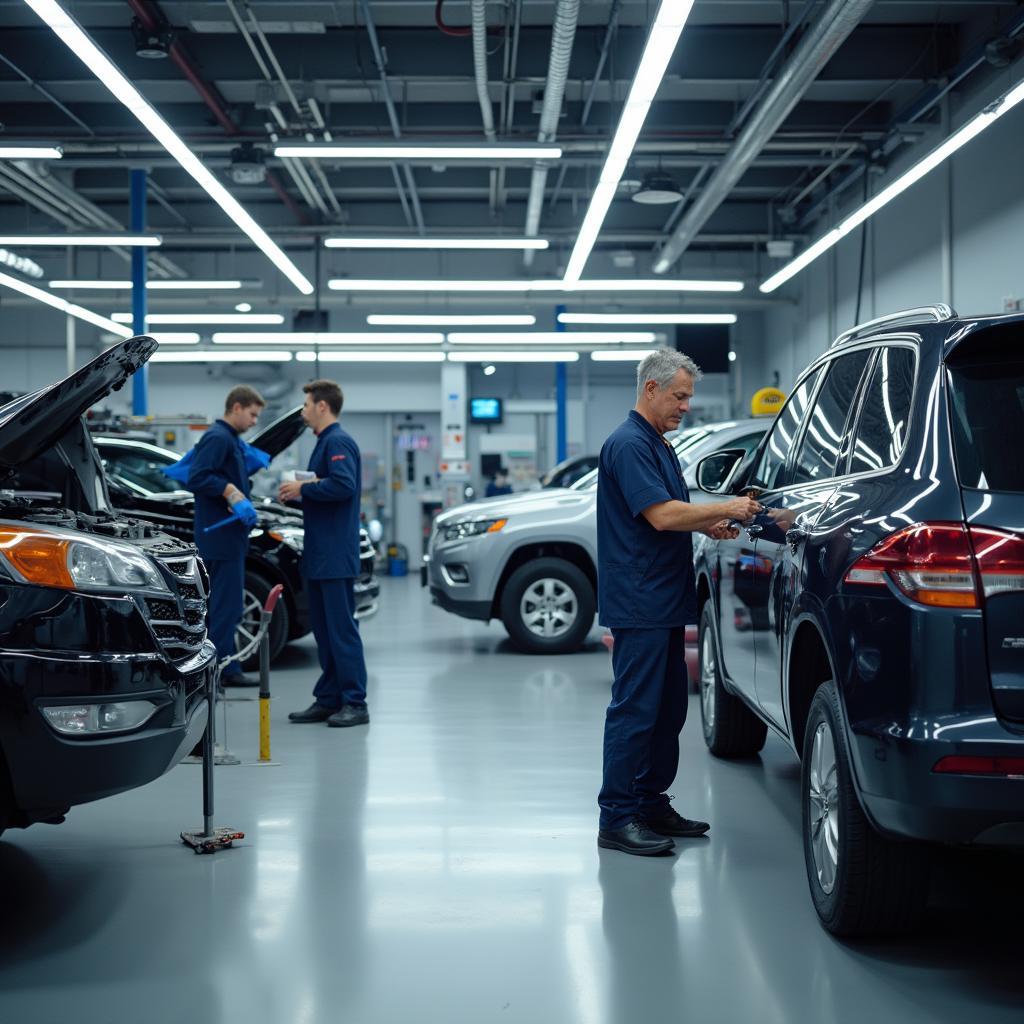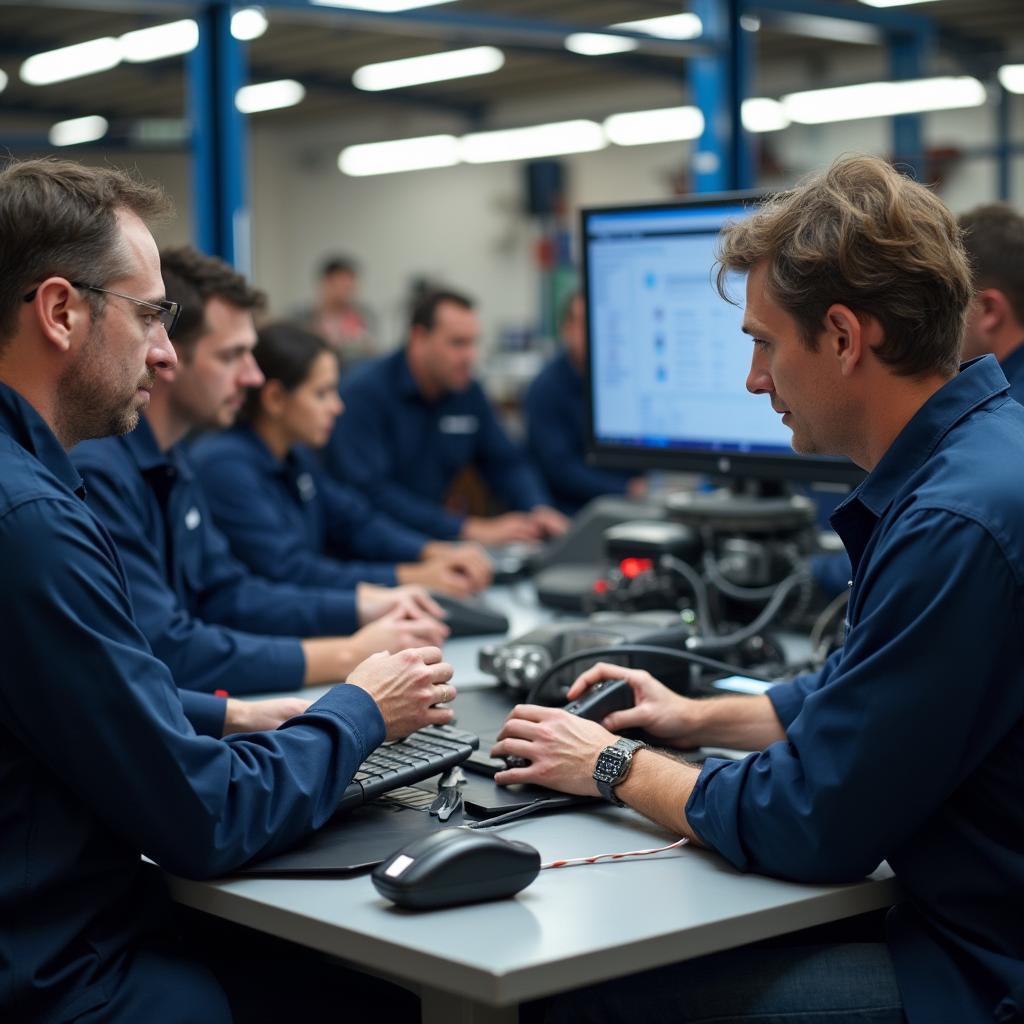The Auto Service Industry, a cornerstone of the global automotive market, encompasses a wide array of businesses providing maintenance, repair, and enhancement services for vehicles. This vital industry is currently undergoing a period of significant transformation, driven by technological advancements, evolving consumer expectations, and a rapidly changing economic landscape.
The Impact of Technological Advancements on Auto Service
The rise of sophisticated vehicle technologies has revolutionized the auto service industry. Modern vehicles are equipped with complex electronic systems, advanced driver-assistance systems (ADAS), and increasingly intricate mechanical components. This shift demands a new breed of auto service technicians equipped with specialized knowledge and tools.
 Modern Auto Service Shop
Modern Auto Service Shop
For example, the proliferation of electric vehicles (EVs) has created a need for technicians trained in high-voltage systems and EV-specific diagnostics. Similarly, the growing complexity of ADAS requires specialized training and equipment to calibrate and repair these intricate systems. Auto service businesses must invest in continuous training programs to keep their technicians abreast of the latest technologies.
Shifting Consumer Expectations in Auto Service
Today’s consumers are more informed and discerning than ever before, expecting transparency, convenience, and personalized experiences. This shift in consumer behavior has led to the emergence of new service models and digital solutions within the auto service industry.
Online appointment scheduling, mobile service tracking, and digital vehicle health reports are becoming increasingly prevalent. Auto service businesses are embracing customer relationship management (CRM) systems and data analytics to personalize their offerings and enhance customer engagement.
 Customer Using Tablet in Auto Shop
Customer Using Tablet in Auto Shop
Furthermore, there’s a growing demand for transparency in pricing and service recommendations. Customers expect detailed explanations of repairs and clear communication throughout the service process.
Key Trends Shaping the Future of Auto Service
The auto service industry is on the cusp of further disruption, with several key trends poised to shape its future:
-
The Rise of Predictive Maintenance: Leveraging telematics and data analytics to anticipate maintenance needs before they arise, reducing downtime and enhancing vehicle longevity.
-
The Growing Importance of Cybersecurity: As vehicles become increasingly connected, ensuring the cybersecurity of onboard systems will be paramount for auto service providers.
-
The Emergence of Mobility-as-a-Service (MaaS): Shifting from individual vehicle ownership to shared mobility solutions will impact traditional auto service models, requiring businesses to adapt their offerings.
-
The Increasing Focus on Sustainability: Consumers are becoming more environmentally conscious, driving demand for eco-friendly auto service practices, including the use of sustainable materials and energy-efficient processes.
Navigating the Evolving Auto Service Landscape
To thrive in this dynamic environment, auto service businesses need to embrace innovation, prioritize customer-centricity, and invest in workforce development.
-
Embrace digital transformation: Implement online booking systems, digital inspection reports, and other digital tools to enhance efficiency and customer experience.
-
Invest in training and development: Equip technicians with the skills and knowledge to service increasingly complex vehicles and emerging technologies.
-
Focus on customer experience: Provide transparent communication, personalized services, and convenient solutions to meet evolving customer expectations.
 Auto Service Technicians Training
Auto Service Technicians Training
- Explore new revenue streams: Consider expanding into areas like predictive maintenance, EV servicing, and ADAS calibration to capitalize on emerging market opportunities.
By adapting to these evolving dynamics, auto service businesses can position themselves for sustained success in the years to come.
auto service trends are constantly changing, and staying ahead of the curve is essential for businesses to remain competitive.
Conclusion
The auto service industry is undergoing a period of unprecedented change, driven by technological advancements, evolving consumer demands, and a dynamic economic landscape. Embracing innovation, prioritizing customer experience, and investing in workforce development are crucial for businesses to navigate this transformative era and achieve long-term success. By understanding the key trends and challenges shaping the industry, auto service providers can seize the opportunities presented by this evolving landscape and continue to play a vital role in the global automotive ecosystem.


